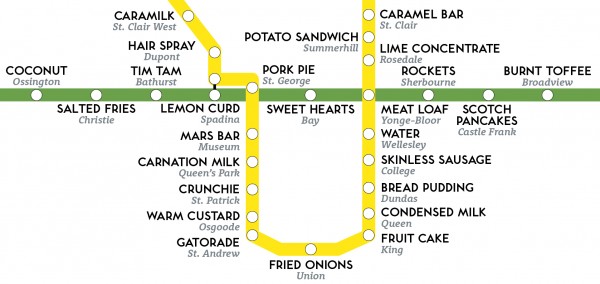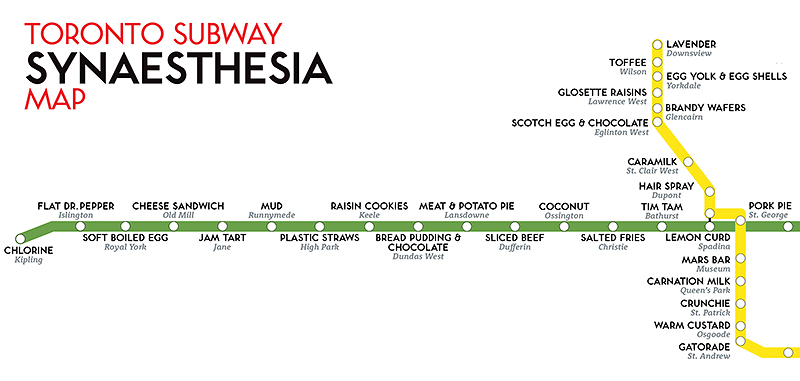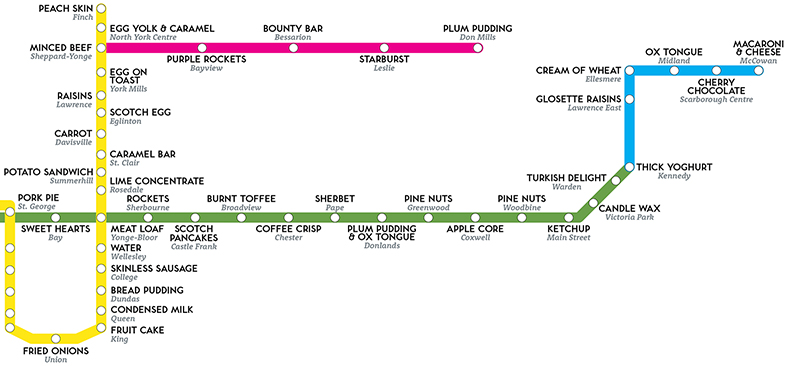Union Station tastes like fried onions.
James Wannerton knows this because he tastes words. Due to a rare and unusual neurological condition called synesthesia, written and spoken language triggers powerful phantom tastes and textures in his mouth. Some good, some really awful.
Runnymede, for example, tastes like mud. The mere mention of it makes him audibly recoil over the phone from his home in Blackpool, England.
“It’s like I’m eating something all day long,” he says. “That’s what it’s like … I know that sounds weird. I know I’m not eating anything. I’m a perfectly rational person, but it does feel like I’m eating something.” Wannerton says that, unlike in other people, the parts of his brain that interpret language, taste, and sensation are linked. “It’s more than just a simple taste, there’s texture involved, sort of a real mouth-feel.”
In 2013, Wannerton put together a map of the London Undergound in which he replaced the names of stations with tastes. Oxford Circus became Oxtail Soup, Waterloo was translated into Fizzy Water, and poor Kilburn High Road came out as Rancid Meat.
TO VIEW A LARGE VERSION OF THIS MAP CLICK HERE
Wannerton started assembling his map of the TTC while in Toronto for a conference in 2013. As president of the UK Synesthesia Association, he’s visited Toronto twice. He says overall the flavours of the subway were pleasant ones.
“[The stations] were just so nice and so mild … that’s what struck me about the system. It does make a difference because it makes you like the city, it really does. You like moving around in it. Some of the stations are awful, but the actual taste of them is quite nice, which makes them nice to me.”
It’s clear from Wannerton’s work that has a predilection for sweet flavours. He thinks many of the tastes he frequently experiences are linked to the food he ate as a child in London.
Growing up, it was hard to convince skeptical physicians that his condition was real. The family doctor dismissed it as an overactive imagination. It wasn’t until the 1980s that Wannerton was inspired to find out more about synesthesia. MRI scanners have since allowed neurologists to probe deep into his brain and learn important lessons about how the senses interact and affect human behaviour.
“It’s a bit like having an eye dropper of taste drop on your tongue. Drip, drip as each thing comes in. It’s on different parts of your tongue. The sweet and sour tend to be the ones on the edges, left and right, and theres other stuff in the middle … it’s just this continuous drip. But also very important is the intensity of it. The best analogy to mix that with would be like a fluorescent light. When you turn it on it flashes—bang—and when you turn it off it fades away.”
Being a synesthete has had a significant effect on Wannerton’s life. He tends to shy away from social interactions and his job in IT allows him to have a minimal amount of spoken interaction. Reading is particularly challenging, he says.
“Theres no way I’d have it taken away, even though it is distracting … I just couldn’t imagine life without it. It’s a bit like saying, ‘well, some of the things I smell are awful, so I want my entire sense of smell taken away.’ You just wouldn’t do it, would you. You’d just put up with the bad bits. That’s probably why I can put up with it.”
TO VIEW A LARGE VERSION OF THIS MAP CLICK HERE
Map design by Julie Fish




7 comments
This is so cool! Out of curiosity, do you know if he has the same taste for place names in 2 different countries? For instance, Scarborough is a place in Canada and England, but do they taste different due to the different contexts of the word?
so “west” tastes like chocolate, I see
So do ‘Victoria’ and ‘Park’ each have different flavours, and it’s only when you combine the two it tastes like candle wax, or do these two different words have the same flavour?
You say ‘minced beef’? More like SHEPPARD’S PIE!
I would have assumed Eglinton tasted like cinnamon buns.
I have this kind of synesthesia too, although mine’s a milder case. The word “college” definitely tastes like cottage cheese though, not sausage.
Side note: The word “moist” has never bothered me because it tastes like gooey chocolate brownies.
It also seems that “wood” has a relation to the pine nut taste.
On a side note I will now only live near stations that I find delicious.